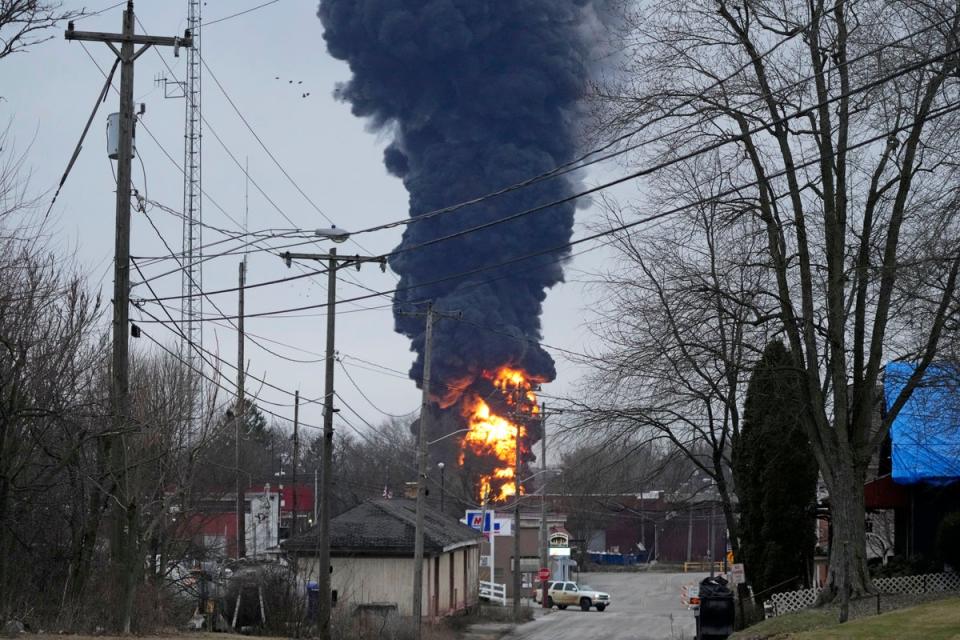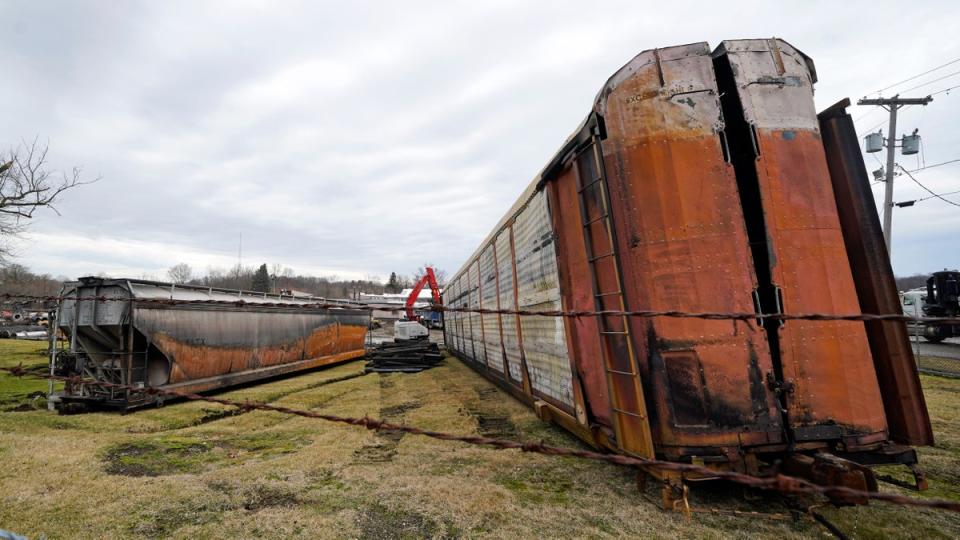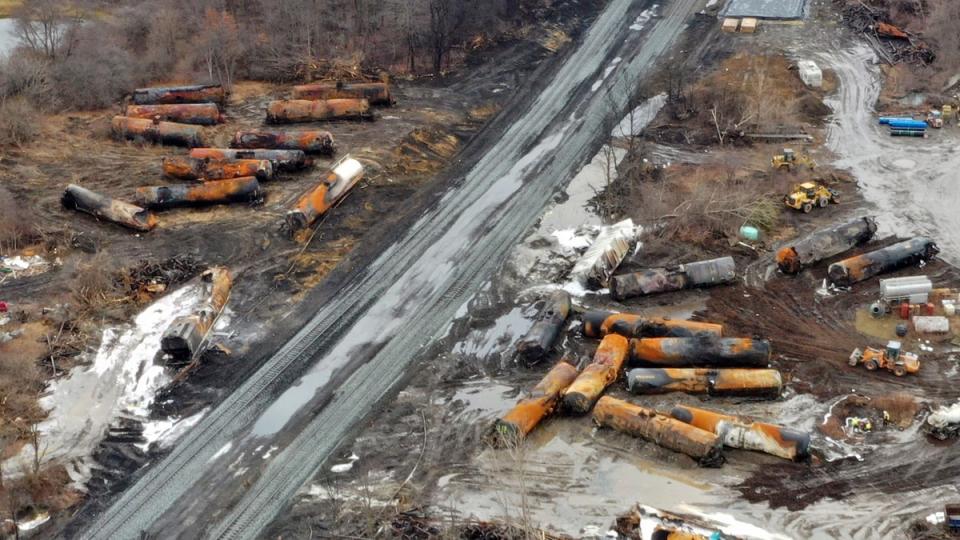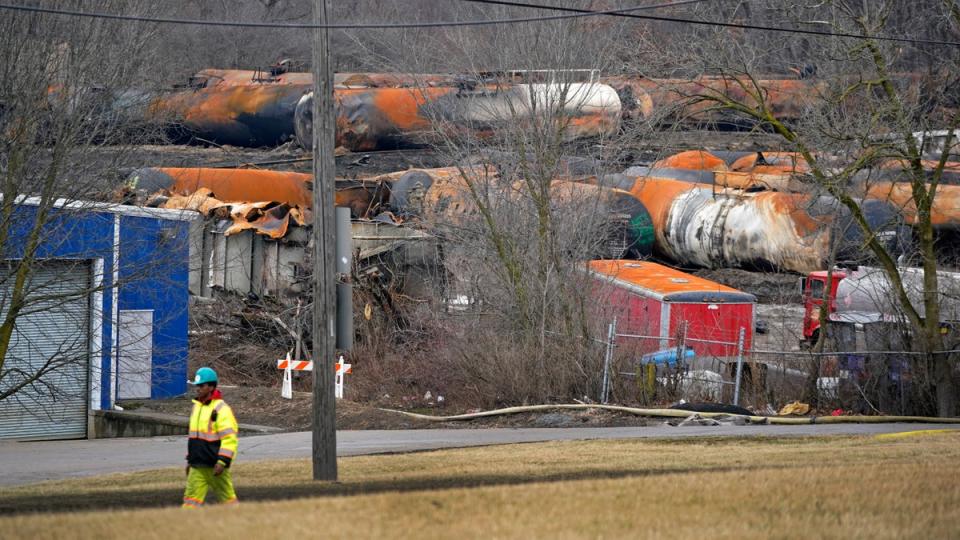Train derailment in East Palestine, Ohio: All we know about affected areas and a cancer-causing chemical

A dark pillar of smoke rose above East Palestine, Ohio, in early February, prompting a mandatory evacuation of the village’s residents. A Norfolk Southern train carrying numerous hazardous chemicals had suffered a catastrophic mechanical failure, resulting in a derailment. Officials feared the flammable chemicals might ignite in a massive blast of shrapnel and poison, and elected to vent and burn the contents of the traincars to mitigate the potential for further destruction.
More than a week after the Ohio train derailment, information is still trickling out about what exactly happened and what risk the 5,000 residents of East Palestine — and the millions in the surrounding region — may face as a result of the crash.
Here’s everything we know about the train derailment, its causes, and what effect it has — and may have — on the people and the environment.
Derailment
On 3 February, around 9pm, a 150-car Norfolk Southern train carrying hazardous chemicals and other materials suffered a catastrophic mechanical failure, hurtling the cars off the tracks near the village of East Palestine, Ohio.
According to the National Transportation Safety Board, a preliminary investigation found that a wheel bearing on one of the train cars’ wheels overheated and failed in the moments prior to the accident.
On the 150 cars on the train, 38 derailed, including 10 of the 20 that were carrying hazardous materials.
Five of the cars on the train were carrying a chemical called vinyl chloride, a colourless, hazardous, and flammable gas used in the production of PVC plastic and vinyl products. Those cars were not breached, but officials feared that fires resulting from the crash could ignite the cars, causing a dangerous explosion.
Norfolk Southern officials conducted a controlled burn of the chemicals on 6 February, venting the gas into a trench and torching it, releasing a massive column of black smoke high into the air above East Palestine.
Mahoning County Hazmat chief Steve Szekely described the fiery blast as the gases were vented.
“The only way I can describe it is like the doors of hell were open. I mean, it was hot and the flames were shooting up into the air at least 100 feet,” he said, according to local broadcaster WKBN.
Vinyl Chloride
Five of the cars were carrying vinyl chloride and were vented. The Environmental Protection Agency said it has not detected chemical contaminants at concerning levels in the hours after the venting, but warned residents they might notice smells resulting from the controlled burn.
"Residents in the area and tens of miles away may smell odors coming from the site. This is because the byproducts of the controlled burn have a low odor threshold," the EPA said in a statement. "This means people may smell these contaminants at levels much lower than what is considered hazardous."
The gas has been linked to an "increased risk of a rare form of liver cancer," called hepatic angiosarcoma, according to the National Cancer Institute. A 2018 journal article studying the cancer called it "exceptionally deadly," and said those who are diagnosed have a life expectancy of just 10 months.
The gas is also linked to primary liver cancer, brain and lung cancers, leukaemia, and lymphoma, according to the National Cancer Institute.
By 8 February residents were told they could return to their homes following a mandatory evacuation. However, two days later the EPA sent a letter to Norfolk Southern detailing the other hazardous materials that were being carried on the train.
Those include butyl acrylate, ethylene glycol monobutyl ether, ethylhexyl acrylate, isobutylene, and benzene residue.
Systemic failures
Experts on rail safety are arguing that the accident was not a freak act of God, but rather the inevitable result of rolled back safety measures and reduced workforces in an effort to boost profits for rail companies.
Steven Ditmeyer, a former top official at the Federal Railroad Administration told investigative news outlet The Lever that the "severity" of the crash was likely aggravated by the lack of Electronically Controlled Pneumatic brakes.
Former President Barack Obama passed legislation making it mandatory for trains carrying hazardous, flammable materials to have ECP brakes, but the order was rescinded in 2017 by the Donald Trump administration.
The NTSB confirmed that the trains that were derailed in the accident were not equipped with ECP brakes, according to The Lever.
"Would ECP brakes have reduced the severity of this accident? Yes," Mr Ditmeyer told the outlet.

He said that the rail companies often "don’t want to spend the money" on updated safety features. In 2017, Norfolk Southern lobbied against the requirement for the brakes, according to The Lever.
The Independent has reached out to Norfolk Southern for comment.
Mr Trump is not the only president with a hand on the current state of the US rail system; Joe Biden ended a rail workers’ strike that would have pushed for increased safety standards and the end of a criticised rail management practice that some argue may have contributed to the crash.
The Railroad Workers Union argued in The New Republic that a management practice adopted by rail companies called Precision Scheduled Railroading, or PSR, may have played a role in the crash and may contribute to future accidents.
PSR manages freight scheduling based on individual cars, rather than considering the entire train. The practice has allowed rail companies to operate with fewer workers and, the RWU argues, with fewer safety precautions, according to the outlet.
Because PSR scheduling does not consider the entire train, it sometimes results in heavier trains being placed in the rear of the train, which can cause them to slam into lighter cars when the brakes are applied suddenly, causing a jackknife. Generally heavier train cars are placed at the head of the train to avoid that motion.
A Norfolk Southern executive celebrated the record train weights and lengths the company ran in a 2022 earnings call.

In December, railworkers threatened to strike, asking for better benefits, working conditions and safer operating procedures, including the end of PSR scheduling and a guarantee that trains would have at least two workers on board at any time.
Mr Biden ended that labour action by signing a bill into law stopping the strike ahead of the busy holiday season.
“The bill I’m about to sign ends a difficult rail dispute and helps our nation avoid what, without a doubt, would have been an economic catastrophe at a very bad time in the calendar,” he said at the time, according to CNBC.
Clean up and consequences
Norfolk Southern officials, the Ohio Department of Natural Resources, the Ohio Department of Health, the Environmental Protection Agency, and the National Transportation Safety Board responded to the accident and have remained on scene since the train derailment.
Ohio Governor Mike DeWine told reporters about 10 days after the accident that he had secured a commitment from Norfolk Southern CEO Alan Shaw that the company would remain in East Palestine until all of the fallout from the accident was rectified.
In the meantime, residents have reported symptoms including runny noses, sore throats and headaches, which ODH official Dr Bruce Vanderhoff said are common side effects of exposure to volatile organic compounds. He said that single, small exposures to VOCs were not likely to cause the long-term health problems as might happen with longer, more concentrated exposure.
He noted that tobacco smoke and gasoline fumes are also considered VOCs.
The EPA and ODNR have been monitoring air and water contaminants since the accident and have reported that the detected levels are not significant enough to cause lasting effects to residents.

However, the ODNR also noted that 3,500 fish were found dead in Columbiana County, where East Palestine is located, in the days after the derailment. Officials told reporters that none of the species were endangered and that there have been no further deaths since the initial discovery.
Residents have also been advised by state officials to drink bottled water until the EPA can conduct further tests to ensure well water in the area is safe for consumption.
When asked what he would do if he lived in East Palestine, Mr DeWine said he would "drink bottled water" and return to his home.
ODNR officials also noted that there have been no confirmed reports of animal deaths — aside from the 3,500 fish — resulting from the train derailment.
Mr DeWine told reporters that the state would commit to staying in East Palestine until the accident has been completely "cleaned up."
In the mean time, residents have been told they are safe to return to their homes and to report any concerns they have to a state hotline.
At least three class action lawsuits have already been filed against Norfolk Southern since the accident, according to ClassAction.org.

